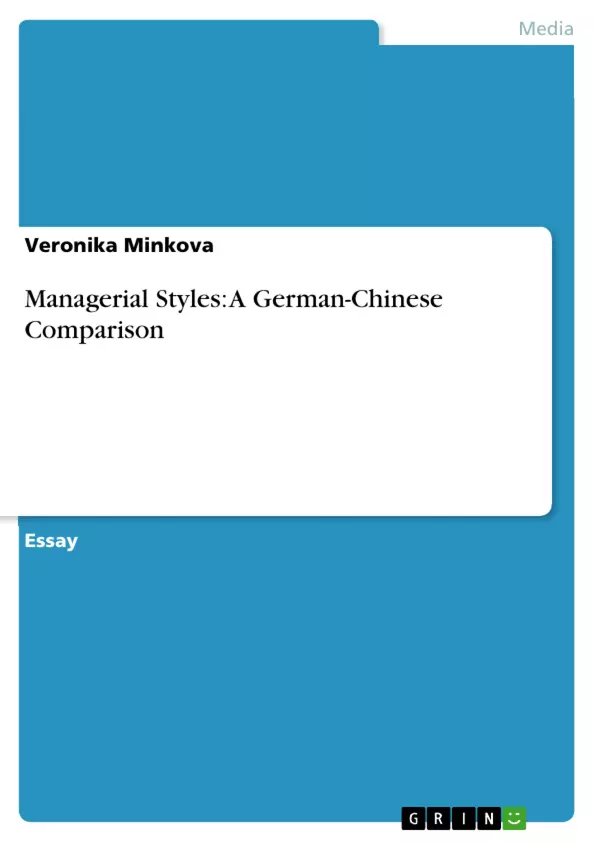The paramount goal of intercultural management is to revise organizational patterns in order to provide an understanding of the different approaches used by managers worldwide. Identifying significant differences in management in Germany and China is established through comparison of socio-cultural and managerial variables. Chinese leadership is characterized by more authorial rather than participative management style. This is explained by Chinese historical and cultural background. The Confucius heritage, legacy of communism, synthetic view of the world and interrelatedness of life in China are some of the essential determinants of managerial styles and social roles at all. Rationalism and objectivism, search for certainty, traditional individualism and analytical thinking are some of the key variables to shape the German managerial styles. Socio-cultural differences are examined in terms of way of thinking and perception of the world; contextual meaning and degree of group-orientation. Managerial differences are divided into three categories: organizational structure, managing processes and interpersonal relations.
Table of Contents
- Introduction
- Socio-cultural Differences
- Cultural determinism in managerial styles
- Socio-cultural variables
- Holistic vs. Analytical thinking
- Communication: contextual meaning
- Individualism vs. collectivism
- Management Differences
- Organizational structure
- Vertical vs. Horizontal
- Laws and Contracts
- Managing Processes
- Decision-making
- Planning
- Interpersonal relations
- Guanxi and Mianzi
- Public vs. Private life
- Organizational structure
- Conclusion
Objectives and Key Themes
This document aims to analyze and compare managerial styles in Germany and China by examining the influence of socio-cultural differences. It explores how cultural background shapes managerial practices, focusing on the unique characteristics of each country. The primary objective is to provide a deeper understanding of the complexities of intercultural management.
- Cultural determinism and its impact on managerial effectiveness
- Socio-cultural variables that differentiate German and Chinese managerial approaches
- Comparison of organizational structure, managing processes, and interpersonal relations in both countries
- Influence of historical and philosophical perspectives on managerial styles
- Implications for successful intercultural management strategies
Chapter Summaries
The introduction sets the stage by outlining the importance of intercultural management and the goal of comparing managerial styles in Germany and China. It highlights the differences in leadership styles between the two countries, attributing them to historical and cultural influences.
Chapter 2 delves into socio-cultural differences, exploring the concept of cultural determinism and its application to managerial practices. It presents the Farmer/Richman model, which emphasizes the role of culture in influencing managerial effectiveness. This chapter also discusses the importance of considering external constraints such as educational, sociological, legal-political, and economic factors.
Chapter 3 dives into specific management differences, focusing on three key categories: organizational structure, managing processes, and interpersonal relations. It examines the contrasting approaches to organizational structure, including vertical vs. horizontal hierarchies, laws and contracts. This chapter also analyzes differences in decision-making, planning, and interpersonal interactions, highlighting concepts such as Guanxi and Mianzi within Chinese culture.
Keywords
The primary keywords and focus topics of this text include intercultural management, managerial styles, German culture, Chinese culture, cultural determinism, socio-cultural variables, organizational structure, managing processes, interpersonal relations, Guanxi, Mianzi, holistic vs. analytical thinking, individualistic vs. collectivistic cultures, and cross-cultural communication.
Frequently Asked Questions
What are the main differences between German and Chinese managerial styles?
German management is based on rationalism, objectivism, and analytical thinking, while Chinese leadership is more authorial, holistic, and based on interrelatedness.
What is the significance of "Guanxi" and "Mianzi" in Chinese business?
"Guanxi" refers to social networks and influence, while "Mianzi" (face) is crucial for interpersonal relations and social standing in Chinese culture.
How does the "Holistic vs. Analytical" thinking affect management?
Germans tend to use analytical thinking to search for certainty, whereas Chinese managers often have a synthetic view of the world, seeing the big picture and interrelatedness.
What is the difference in organizational structures between the two countries?
The document compares vertical vs. horizontal hierarchies and how laws and contracts are perceived differently in German and Chinese organizations.
Why is Chinese leadership often more authorial than participative?
This is largely explained by the Confucian heritage, the legacy of communism, and a cultural focus on collectivism over individualism.
- Citar trabajo
- Veronika Minkova (Autor), 2009, Managerial Styles: A German-Chinese Comparison, Múnich, GRIN Verlag, https://www.grin.com/document/180847



